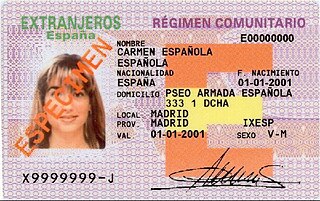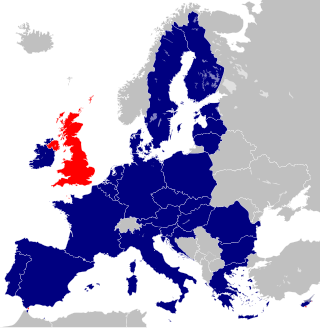
Indefinite leave to remain (ILR) is an immigration status granted to a person who does not hold the right of abode in the United Kingdom (UK), but who has been admitted to the UK without any time limit on their stay and who is free to take up employment, engage in business, self-employment, or study. When indefinite leave is granted to persons outside the United Kingdom it is known as indefinite leave to enter (ILE).

The Common Travel Area is an open borders area comprising the United Kingdom, Ireland, the Isle of Man and the Channel Islands. The British Overseas Territories are not included. Based on agreements that are not legally binding, the internal borders of the CTA are subject to minimal controls and can normally be traversed by British and Irish citizens with minimal identity documents. The maintenance of the CTA involves co-operation on immigration matters between the British and Irish authorities.

European Union citizenship is afforded to all citizens of member states of the European Union (EU). It was formally created with the adoption of the 1992 Maastricht Treaty, at the same time as the creation of the EU. EU citizenship is additional to, as it does not replace, national citizenship. It affords EU citizens with rights, freedoms and legal protections available under EU law.

The European single market, also known as the European internal market or the European common market, is the single market comprising mainly the 27 member states of the European Union (EU). With certain exceptions, it also comprises Iceland, Liechtenstein, and Norway and Switzerland. The single market seeks to guarantee the free movement of goods, capital, services, and people, known collectively as the "four freedoms". This is achieved through common rules and standards that all participating states are legally committed to follow.
The right of abode is an individual's freedom from immigration control in a particular country. A person who has the right of abode in a country does not need permission from the government to enter the country and can live and work there without restriction, and is immune from removal and deportation.
Chen v Home Secretary was a decision of the European Court of Justice which decided that a minor who is a national of a European Union member state has the right to reside in the European Union with his or her third-country national parents, provided the minor and parents have health insurance and will not become a burden on the public finances of the member state of residence.
The freedom of movement for workers is a policy chapter of the acquis communautaire of the European Union. The free movement of workers means that nationals of any member state of the European Union can take up an employment in another member state on the same conditions as the nationals of that particular member state. In particular, no discrimination based on nationality is allowed. It is part of the free movement of persons and one of the four economic freedoms: free movement of goods, services, labour and capital. Article 45 TFEU states that:
- Freedom of movement for workers shall be secured within the Community.
- Such freedom of movement shall entail the abolition of any discrimination based on nationality between workers of the Member States as regards employment, remuneration and other conditions of work and employment.
- It shall entail the right, subject to limitations justified on grounds of public policy, public security or public health:
- The provisions of this article shall not apply to employment in the public service.
A European Economic Area Family Permit was an immigration document that assisted the holder to enter the United Kingdom as a family member of a citizen of a contracting state to the European Economic Area agreement or a Swiss citizen. They were issued by the UK immigration authorities under the Immigration Regulations 2006 (UK).
Family reunification is a recognized reason for immigration in many countries because of the presence of one or more family members in a certain country, therefore, enables the rest of the divided family or only specific members of the family to emigrate to that country as well.

European Economic Area (EEA) citizens have the right of free movement and residence throughout the EEA. This right also extends to certain family members, even if they are not EEA citizens. A Residence card of a family member of a Union citizen is issued to the family member to confirm this right of residence. The holder of a valid Residence Card is entitled to use this document in lieu of an entry visa for entry to all EEA member states. There is not a unified format for this card throughout the EU.

The Citizens’ Rights Directive 2004/38/EC sets out the conditions for the exercise of the right of free movement for citizens of the European Economic Area (EEA), which includes the member states of the European Union (EU) and the three European Free Trade Association (EFTA) members Iceland, Norway and Liechtenstein. Switzerland, which is a member of EFTA but not of the EEA, is not bound by the Directive but rather has a separate multilateral sectoral agreement on free movement with the EU and its member states.
The Immigration Regulations 2006, amended by SI 2009/1117, SI 2011/1247 and SI 2015/694 and which have now been mostly repealed and superseded by the Immigration Regulations 2016, was a piece of British legislation which implemented the right of free movement of European Economic Area (EEA) nationals and their family members in the United Kingdom. It is based on Directive 2004/38/EC. It allows EEA citizens and their family members to live and work in the UK without explicit permission. Although Swiss citizens are covered by a separate bilateral agreement; they are treated basically the same as EEA nationals. Family members may need a special entry clearance to enter the UK.
Metock v Minister for Justice, Equality and Law Reform (2008) C-127/08 is a European Union law case, significant in Ireland and Denmark, on the Citizens Rights Directive and family unification rules for migrant citizens. Citizenship of the European Union was established by Article 20 of the Treaty on the functioning of the European Union (TFEU) and the Citizenship Directive 2004/38 elaborates the right of Union citizens and their family members to move and reside freely in the territory of a member state, consolidating previous Directives dealing with the right to move and reside within the European Community (EC).

The visa policy of Ireland is set by the Government of Ireland and determines visa requirements for foreign citizens. If someone other than a European Union, European Economic Area, Common Travel Area or Swiss citizen seeks entry to Ireland, they must be a national of a visa-exempt country or have a valid Irish visa issued by one of the Irish diplomatic missions around the world.
United Kingdom immigration law is the law that relates to who may enter, work in and remain in the United Kingdom. There are many reasons as to why people may migrate; the three main reasons being seeking asylum, because their home countries have become dangerous, people migrating for economic reasons and people migrating to be reunited with family members.

The 2015-16 United Kingdom renegotiation of European Union membership was an unimplemented non-binding package of changes to the United Kingdom's terms of its European Union (EU) membership as a member state and changes to EU rules which were first proposed by Prime Minister David Cameron in January 2013, with negotiations beginning in the summer of 2015 following the outcome of the UK General Election. The package was agreed by the President of the European Council Donald Tusk, and approved by EU leaders of all 27 other countries at the European Council session in Brussels on 18–19 February 2016 between the United Kingdom and the rest of the European Union. The changes were intended to take effect following a vote for "Remain" in the UK's in-out referendum in June 2016, at which point suitable legislative proposals would be presented by the European Commission. Due to the outcome of the referendum in which the electorate voted by 51.9% to 48.1% to leave the bloc, the changes were never implemented and subsequently the United Kingdom withdrew from the European Union in January 2020.
Coman and Others v Inspectoratul General pentru Imigrări and Ministerul Afacerilor Interne is a 2018 case of the European Court of Justice (ECJ) that affirmed residency rights in EU countries, to the spouse of an EU citizen who is exercising their right to freedom of movement and if the marriage was legally performed in an EU member state.

The Immigration Regulations 2016, or EEA Regulations 2016 for short, constituted the law that implemented the right of free movement of European Economic Area (EEA) nationals and their family members in the United Kingdom. The regulations were repealed by the Immigration and Social Security Co-ordination Act 2020 on 31 December 2020, at the end of the transition period.
The European Union Settlement Scheme is an immigration regime of the United Kingdom introduced by the Home Office in 2019, under the new Appendix EU of the UK's Immigration Rules, in response to the Brexit situation. EUSS processes the registration of nationals of EU and EFTA countries who were resident in the United Kingdom prior to the end of the Brexit transition/implementation period at 11pm GMT on 31 December 2020. Successful applicants receive either 'pre-settled status' or 'settled status', generally depending on the length of time they have been resident in the United Kingdom.
In EU law, reverse discrimination occurs when the national law of a member state of the European Union provides for less favourable treatment of its citizens or domestic products than other EU citizens/goods under EU law. Since the creation of the Single Market, the right of EU citizens to move freely within the EU with their families. The right to free movement was codified in EU Directive 2004/38/EC which applies across the whole EEA. However, reverse discrimination is permitted in EU law because of the legal principle of subsidiarity, i.e. EU law is not applicable in situations purely internal to one member state. This rule of purely internal situation does not apply if the EU citizens can provide a cross-border link, e.g. by travel or by holding dual EU citizenship. EU citizens and their families have an automatic right of entry and residence in all EU countries except their own, with exceptions created by a cross-EU state border link. For example, an Irish citizen living in Germany with his family before returning to Ireland can apply for EU family rights. This is referred to as the Surinder Singh route. The cross-border dimension has been the focus of many court cases in recent years, from McCarthy to Zambrano.







